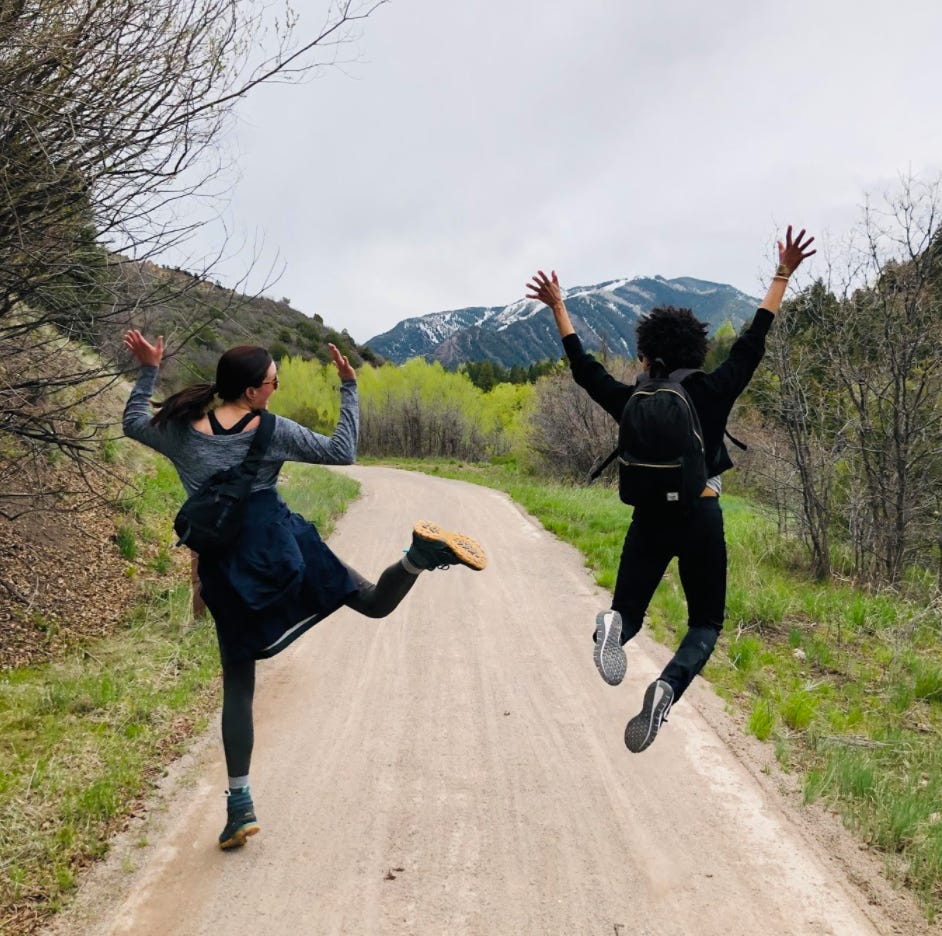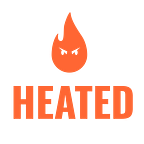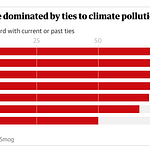Good afternoon everyone! Happy Monday and Happy Indigenous Peoples Day.
Today being a federal holiday, I wasn’t intending to send out a newsletter. But it turns out, the newsletter I sent on Thursday—my interview with Ayana Elizabeth Johnson and Katharine Wilkinson, the editors of All We Can Save: Truth, Courage, and Solutions for the Climate Crisis—never actually sent. So I’m trying this again now, and hopefully this time it successfully hits your inboxes.
One reason I probably didn’t notice Thursday’s newsletter slip by was because, real talk, these last two months have been a total brain/soul suck. Sometimes, particularly on Thursdays, I just hit send and tune alllll the way out. And I think in retrospect, last week—after that awful Vice Presidential debate—I probably just tuned out about 15 seconds too early.
I need to be super *on* if I’m going to cover the climate crisis effectively every day. So in the interest of delivering on that promise, I’m going to take a small break this week. Book club will go on as planned; you’ll get discussion questions and further reading for All We Can Save on Tuesday and a new Q&A with a section author on Thursday. But I’m gonna take Wednesday off, as a birthday present to myself and all of you. (Wednesday is my 31st birthday. Please clap).
In the meantime, please enjoy my interview with Ayana and Katharine about All We Can Save’s “Begin” section, which you can read in its entirety in Elle magazine. We go over the topic of “climate feminism,” what it’s like to release a climate book in the middle of a record-breaking extreme weather season, and who the best “climate dudes” are.
I wish we could have had this conversation in a bar, but alas, it’s still COVID season. So we did it on the phone, and now it’s in the newsletter. The written interview below is edited and condensed for clarity, but I also uploaded the whole audio file at the top of this email, so you can listen to our conversation in its entire, unedited glory if you’d like.
As always, thanks for allowing me the ability to take these small breaks when I need them. I’ll see you back in full force next week.

Value interviews like this? They’re made possible by paid subscribers. HEATED is 100 percent independent and reader-funded, and every subscription makes a difference.


Scene: The rage hike in Colorado when @drkwilkinson and @ayanaeliza came up with the idea for this book. It was an idea born out of our frustration that so many of the incredible women climate leaders we know don’t get the recognition they deserved or the resources they need. And born from knowing most of them won’t stop doing their critical climate work to write a book, which is still a primary path to thought leadership. So, we brought the book, the megaphone, the spotlight to them.
Emily Atkin: You opened up the book by introducing the concept of climate feminism. I think that's very lovely, but there's also potential for that to be kind of risky.
Just from my own experience, every time I combine climate change and feminism—even in a community as progressive as HEATED—I find myself getting some pushback from men and women who say it’s divisive in some way. I'm wondering if that jives with your experience at all.
Katharine Wilkinson: Yeah, this is an interesting question. It’s making me think back to when, after the point that we could no longer make edits, Ayana and I realized: “Maybe we should have included somewhere that feminism just means gender equality?”
Ayana Elizabeth Johnson: It’s on a list of possible changes to make for our next edition.
KW: Feminism should not be such a loaded word. It's only a loaded word because forces have made it so, in the same way that forces have made climate change a loaded term.I would hope that people could bring their critical faculties and bullshit detectors with them beyond beyond the climate space.
This is just historical reality. We started with the beginning of women's climate leadership, which starts with Eunice Newton Foote, who was both a scientist and a feminist. That is just a truth of her story. So I wonder if it will actually kind of help people to realize that actually, these two things have gone together from the beginning. And we've had now more than a century and a half to get with the program.
AEJ: I would just add that at no point did we worry about this when writing the book. The only time we did was when we were deciding on the title and the subtitle. This is a book written by women, but it's a book for everyone. So we did opt not to say, like, “writings of 40 women on climate” as the subtitle—in part because we wanted something a bit more poetic—but also because we wanted everyone to pick up this book.
It's the same thing we thought about when we designed a cover. We got some really pink options that we rejected.
EA: No, you didn't. Really?
AEJ: Oh yeah. I mean, fuchsia, but still.
EA: Were there ever like, boobs on it? Or flowers? Orchids?
KW: Boobs in the form of two Earths! That was one. No, not really.
AEJ: I wish. But I think to your point, we certainly want everyone to feel like this book is for them. And perhaps it is the people who would most recoil from a book that mixes feminism with climate that we would most like to read the book. But we don't really have the ability to tiptoe around these issues.
I will say that the essays themselves are not about feminism. It's just a book written by women. Like every essay is not about like “being a woman in climate.” They’re about farming and geo-engineering and policy and journalism. Right. So I think that's an important distinction. It's a book by women, but it's not about being women. And it's not just for women.
EA: And it’s not a man-bashing book.
AEJ: No. Except to the extent that some people find facts uncomfortable. The fact is that women are involved in environmental policy.That's just statistics. So if you feel bashed by facts, you might be slightly upset with the introduction.
KW: And we make the point really intentionally that this is not about only women. It's about ensuring we have diverse leadership and diverse talent coming to the climate movement, and also that leadership that is more characteristically feminine and has a more feminist commitment is not limited to people of any gender. Don Cheadle and Mark Ruffalo have proclaimed themselves proud climate feminists also.
EA: That’s hot. I like that.
EA: I want to talk about the timing of the release of the book. When I released HEATED last year, it was September—which meant the release landed right in the middle of hurricane and wildfire season. I didn't even think about this at the time, but I think that had a big impact on how many people signed up. It was this horrifying marketing tool that I did not realize I was using.
I'm wondering if if you have been experiencing a similar phenomenon. Have you been seeing people interested in this book, specifically because of the particular moment that we're in? And did you intend the release to coincide with this moment?
KW: Oh my god. Yeah, I think [our marketing person] messaged Ayana at some point, saying “Oh wow, not at all intended, but I guess good work having this land in the overlap of hurricane and fire season?” Because I think we are seeing that.
But our intention was twofold. One, we were trying to aim for a Climate Week release, because we figured a lot of people who are contributors above would be in New York, and we might have a chance to celebrate together. Ha-ha, not a thing anymore! And the other was that we wanted to get it out before the election.
AEJ: We wanted to perhaps even influence the public discourse and make the discussion around electoral politics consider climate a bit more deeply. We also started putting this book together in December, and didn't predict that a Democratic primary would have been so focused on climate—which is obviously a wonderful relief. We had an incredible essay by Maggie Thomas, who had been Elizabeth Warren's climate adviser after being Jay Inslee’s. So we have her story about that. But yeah, our choices were basically September or February. And we just couldn't wait to get this out into the world, and busted our butts to make an entire book in nine months.
KW: And that is not recommended.
EA: I remember meeting you guys in New York, and seeing you guys bunkered down working in a corner in between having to do talks and network, and I was like, “This looks like it's not fun.”
AEJ: It was actually such a joy. There were moments we were just like, “what were we thinking?” But almost always it was very clear to us that it was worth the effort, and that a lot of the extra work was because we tend towards the perfectionist side of the spectrum.
EA: Which, honestly, those are the those are the type of people you want at the forefront of leading the response to a very complicated climate crisis. You don't want them to be like, whoops, forgot about the ocean!
This question is kind of broad, but what are you individually most proud of about the book? When you hold the final product in your hands and you're flipping through what do you find yourself going to first, or feeling first?
AEJ: I am most proud of how many incredible climate leaders never told their stories before, and wrote them down for this book.
Like Mary Anne Hitt, who’s led the Beyond Coal campaign for a decade, which has shut down over 320 coal-fired power plants. She’s never written her story and her lessons learned. The same goes for Maggie from the [Warren] campaign, and Jacquie Patterson from the NAACP.
These are people who just do the work, and don't worry about getting credit or being climate celebrities—although, they could, now that there's a weird category for that. So that brings me like a lot of joy and even pride, to know that we were a part of helping to write this little bit of history in a way and helping people to tell their own stories.
KW: I am teaching the book to an undergraduate seminar course called “The Call of Climate.” And it's been really amazing to watch my students read the book, and have the “A-ha” moments from different essays. And to see them start connecting the connecting the dots through these running threads.
One of my students, when we were talking about The Begin, she said “I was shaking while I read it, because I felt so empowered.”
EA: Awww!!
KW: The fact that there may be particularly young women who are coming to this work, and not just feeling like, “Oh, it's fine that I am a woman and I have some commitment to gender equality,” but actually realizing that will make them stronger climate leaders.
I can just speak for myself and say, so much of this journey I have felt like I have silenced parts of myself, or tucked them to the side, and led with the part of me that has a doctorate. And I think that short-changed my readership. And I really hope that this book can be part of stopping the short-changing of transformational leadership going forward.
Tied to that, one of the things that I really love is that this book is beautiful. The integration of these incredible, powerful essays with poetry—in some cases poetry that I have loved and felt guided by for years. I think it feels like a different kind of invitation to to the climate conversation. And I hope it will be one that reaches people who maybe haven't felt so invited by, like, reams of charts.
EA: Yeah, I mean, the first thing I did when I got the book, obviously, was flipped to my own essay to see it. But next to it was this poem by Anne Haven McDonnell called, She Told Me The Earth Loves Us. And instead of reading my own essay, I read this poem like five times. And I found myself feeling very emotional, and so proud that I could have my work next to this piece.
AEJ: That makes me so happy.
EA: It made me really happy! And I love how the climate conversation has evolved to not only recognize, but demand our full human self. Because I feel the same way, as you said Katharine, about in the beginning [of my career] approaching this like, “I'm a science reporter, I'm an environmental reporter, I report on emissions and I'm a journalist.” And you're siloing these other parts of yourselves, like the parts that are committed to general equality, and good quality of life for everybody, and racial justice. You think, that's not that's not part of climate. If I join this movement, then then I have to silence all those other parts.
I think it is really great to have a work that shows you not only that you don't have to do that, but that you really shouldn't do that.
EA: You talked about about students having these “A-ha” moments. And I'm wondering if either of you had moments like that putting together this book. Were there any big “A-ha” moments where you really learned something you didn't know when you were putting it together?
KW: I would say for me, one of the things that happened was there was a lot of deepening of my understanding of certain areas. Like I certainly I knew about the Beyond Coal campaign, but I did not understand the whole suite of those insights that grew out of it. I knew we needed a piece about litigation. And through that I came to a different appreciation of our bedrock environmental laws.
Part of our part of our hope was that we could create a book meets the moment where people actually are hungry for more nuanced exploration of these topics. And I would say this book helped me arrive at more nuance on lots of different fronts.
AEJ: We were feeling like people were ready for ready to deal with more of the complexities of climate change. So this book doesn't try to oversimplify things, although we did work really hard to eliminate all jargon, and make it accessible to everyone.
This book has a lot of information, but mostly what it has is wisdom. You come away from it with a more solid grip on the truth. And with all of these pearls of wisdom, you don't come away from this book necessarily rattling off more facts—although for those who are into facts, I will say, there are a lot of them. And we marked our favorite statistics, our favorite facts, with an asterisk. So if you just want to through the book for facts, you can just look at all the asterisks.
EA: My last question, if you have time, is just: If you were going to include dudes in the book, who are some of your favorite climate dudes that you would have wanted to include?
AEJ: Oh man.
KW: Gosh, we never even thought about it.
AEJ: What I would like to see as more climate dudes championing this book, which has been not as loud as I would have liked. And that's the problem. This whole shine theory; this whole, “We're in it together;” this whole mosaic and chorus and collective approach that is stereotypically feminine—that's what we need.
The climate crisis, as Katherine so perfectly puts it, is a leadership crisis. So before any of them can get in the book, I think they need to champion the collective work that the book references.
I will say, Bill McKibben is a great example of that.
KW: And Brian Kahn.
EA: Oh yeah. Two very good ones.
KW: Two very good climate dudes.
EA: And Don Cheadle.
KW: Yes. But yeah, we do not want this to be a book that just circulates among women and non-binary folks in the movement. There is a lot of important content here.
AEJ: Climate dudes, read this book!


OK, that’s all for today—thanks for reading HEATED! If you’d like to share this piece as a web page, click the button below.
To support independent climate journalism that holds the powerful accountable—and to receive HEATED’s reporting and analysis in your inbox four days a week—become a subscriber today.
If you’re a paid subscriber and would like to post a comment—or if you would like to view comments from paid subscribers—click the comment button:
Stay hydrated, eat plants, break a sweat, and have a great day!












